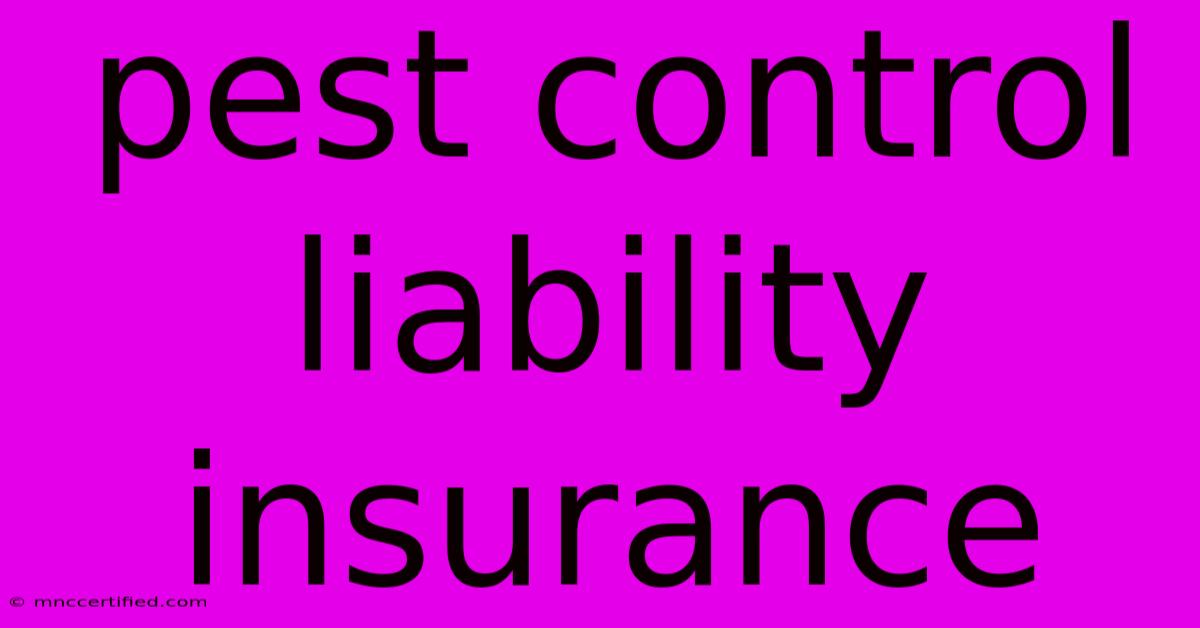Pest Control Liability Insurance

Table of Contents
Pest Control Liability Insurance: Protecting Your Business from the Unexpected
Pest control is a vital service, but it also carries significant risks. One wrong move, a missed precaution, or an unforeseen reaction to a treatment can lead to property damage, injury, or even legal action. That's why pest control liability insurance is not just a good idea – it's a necessity for any business operating in this field. This comprehensive guide will explore the importance of this insurance, what it covers, and how to choose the right policy for your needs.
Understanding the Risks in Pest Control
The pest control industry faces a unique set of potential liabilities. These risks can be broadly categorized as:
Property Damage:
- Accidental damage during treatment: Spills, equipment malfunctions, or improper application of pesticides can damage a client's property. This could range from minor cosmetic damage to extensive structural repairs.
- Secondary damage from pests: If your treatment fails to effectively control the pest infestation, resulting in further damage to the property, you could be held liable.
- Damage caused by products used: Certain pesticides or other products used in pest control can react negatively with specific materials, causing damage.
Bodily Injury:
- Reactions to pesticides: Clients, employees, or even bystanders can experience allergic reactions or other health problems due to exposure to pesticides.
- Injuries from equipment: Accidents involving equipment like ladders, sprayers, or traps can result in injuries.
- Pest-related injuries: While less common, clients could be injured by pests themselves if your treatment fails to effectively control the infestation.
Advertising Injury:
- Libel or slander: False statements made about competitors or clients can lead to legal action.
- Copyright infringement: Using copyrighted images or materials in your marketing can result in legal issues.
What Does Pest Control Liability Insurance Cover?
A comprehensive pest control liability insurance policy typically covers:
- Third-party bodily injury: This covers medical expenses and legal costs if a third party is injured due to your business operations.
- Third-party property damage: This covers the cost of repairing or replacing property damaged as a result of your work.
- Advertising injury: This protects your business against claims arising from libel, slander, or copyright infringement.
- Medical payments: This helps cover the medical expenses of injured parties, even if you're not legally liable.
Choosing the Right Pest Control Liability Insurance
Selecting the right policy depends on several factors:
- Size and type of your business: A larger business with more employees and higher revenue will require a larger policy limit. The specifics of your pest control services (residential, commercial, specialized) will also influence your needs.
- Your risk profile: Your risk profile is assessed based on factors such as the types of pesticides used, your safety procedures, and your claims history.
- Your budget: Insurance premiums vary based on the factors listed above. You need to balance the cost of the premium with the level of protection you need.
Key Considerations when Choosing a Policy:
- Policy Limits: The maximum amount your insurer will pay for a single claim or in a policy year. Choose limits that reflect your potential liability.
- Deductible: The amount you pay out-of-pocket before your insurance coverage kicks in. Higher deductibles often mean lower premiums.
- Exclusions: Understand what your policy doesn't cover. Some policies may exclude certain types of pesticides or specific types of damage.
- Claims Process: Review the insurer's claims process to understand how easily you can file a claim and receive support.
Beyond Liability: Other Important Insurance for Pest Control Businesses
While liability insurance is crucial, consider other types of insurance to protect your business fully:
- Workers' Compensation Insurance: This covers medical expenses and lost wages for employees injured on the job.
- Commercial Auto Insurance: This covers accidents involving your company vehicles.
- Property Insurance: This protects your business property, equipment, and inventory from damage or loss.
Pest control liability insurance is not an optional expense; it's an essential investment in the long-term health and stability of your business. By understanding the risks, choosing the right coverage, and implementing robust safety procedures, you can protect yourself, your employees, and your clients from the unforeseen consequences of this critical service. Don't delay – contact an insurance broker today to discuss your needs and secure the appropriate coverage.

Thank you for visiting our website wich cover about Pest Control Liability Insurance. We hope the information provided has been useful to you. Feel free to contact us if you have any questions or need further assistance. See you next time and dont miss to bookmark.
Featured Posts
-
Icc Arrest Warrants Issued
Nov 22, 2024
-
Ex Boss Reveals Captain Tom Charity Shock
Nov 22, 2024
-
Putin Announces New Missile In Ukraine
Nov 22, 2024
-
Steelers Browns Game Live Updates And Tv
Nov 22, 2024
-
Michigan Lands 5 Star Qb Underwood
Nov 22, 2024